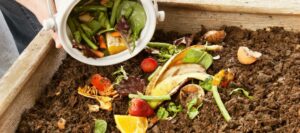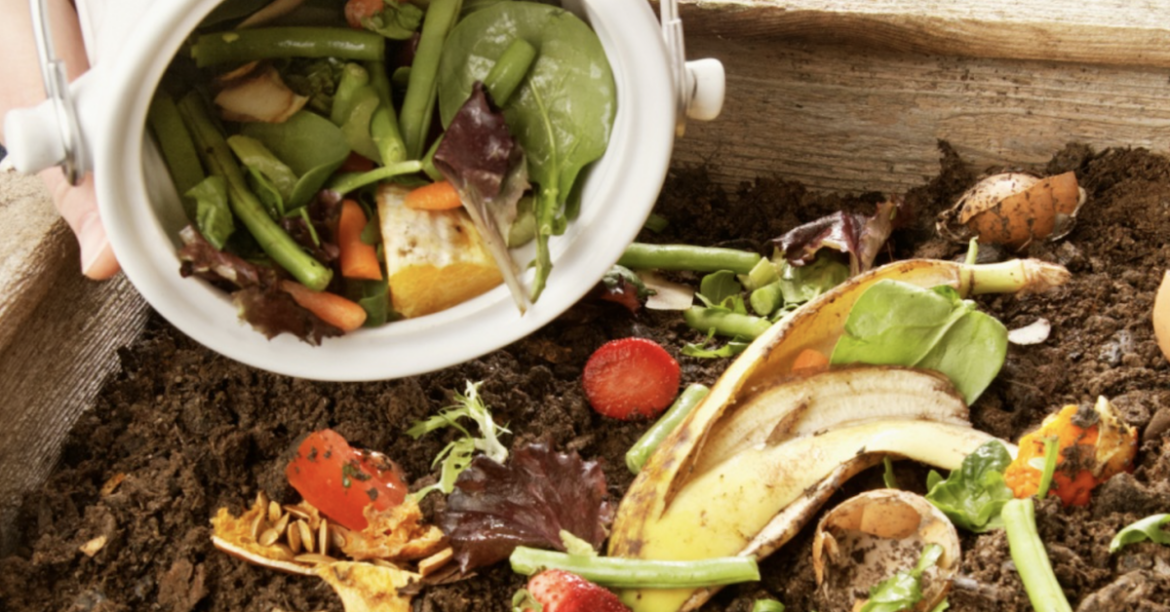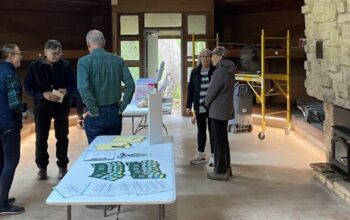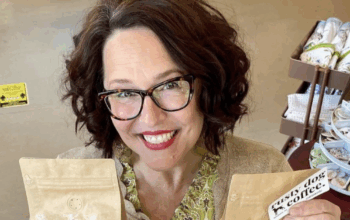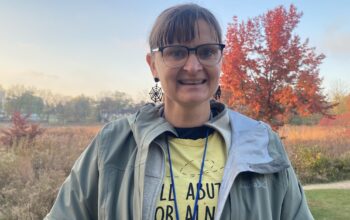At a farmers market, you may immediately picture vibrant bell peppers protruding from wooden cartons, flower bouquets delicately wrapped in ornate cloths or the season’s fruits sparkling in the early morning sunshine.
At both the South Madison Farmers’ Market and Eastside Farmers’ Market, though, you can find a different type of station embedded alongside freshly grown delicacies.

Throughout most of the 2023 market season, Sustain Dane, a nonprofit focused on providing the resources for individuals, businesses and organizations to generate sustainability change in Dane County, collected food scraps at both venues. As part of its growing commitment to food scrap collection accessibility and education, Sustain Dane hauls the material to Neighborhood Food Solutions’ nearby urban farm to compost and establish healthy soil for agricultural practices.
These practices, however, are not universal. Between 2016 and 2021, the amount of food waste generated across all food sectors ballooned from 76.5 million to 80 million food waste tons throughout the United States, according to a recent study from the national nonprofit ReFED. More often than not, these scraps sit atop endless heaps of junk in landfills, which generate methane and increase greenhouse gas emissions.
By redirecting food scraps from landfills to farms, the organization empowers locals to participate in the process and prevents thousands of food scrap pounds from contributing to harmful emissions produced in the Dane County Landfill.
The U.S. Environmental Protection Agency considers food waste the most common substance dumped in the United States, comprising 24% of landfilled material across the nation. With a significant greenhouse footprint, these seemingly infinite tons of waste exacerbate the country’s dire climate crisis.
“You have to look at the methane situation,” said Joanne Tooley, founder and owner of Earth Stew Compost Services, LLC, a food waste recycling service in the greater Madison area. “When they throw their food waste into a bag and it could be thrown into the landfill, it's going to eventually emit greenhouse gas. It’s a huge situation here, not only in Madison, but across the United States and the world.”
But by preventing food scraps from entering Dane County’s Rodefeld landfill, which has less than 10 years of space remaining, Sustain Dane aims to mitigate these consequences within the greater Madison area.
Claire Oleksiak, Sustain Dane’s executive director since 2019, has witnessed the organization make strides in the right direction.
According to Oleksiak, in 2022, Sustain Dane prevented nearly 10,000 pounds of food waste from reaching the landfill. Oleksiak’s optimism arrived in early October, roughly one month before the food scrap collection wrapped for the season. As of Nov. 29, Sustain Dane had diverted approximately 18,877 total pounds of food waste from the landfill in 2023.
Once collected, those 18,877 total pounds morph into composted soil, an environmentally sensitive practice for reusing naturally decomposed matter. As opposed to clogging up space and effusing harmful gasses in a landfill, raw fruits, vegetables, eggshells and coffee grounds can provide a boost for the next generation of farmers.
Ben Stanger, founder and chief executive officer at Green Box Compost, an organization responsible for residential, multi-family and commercial compost pickup in Dane County, recognizes the merit in this tactic.
“Landfills are an endpoint as opposed to being a process,” Stanger said. “With composting, you have a throughput and a space where you can compost. It doesn’t grow any larger, and you just reuse that product, whereas landfills continue to expand and emit methane.”
Green Box, a budding compost organization in the greater Madison area, collects its customers’ food scraps and composts materials in a temperature-controlled vessel to create and redistribute fertile soil in a matter of weeks. After signing up on the organization’s website, Green Box’s clients canactively recycle their waste while contributing to a circular economy.
Stanger’s company, founded almost two years ago, also collaborates with Sustain Dane to advance the progress of compositing within Dane County.
According to Stanger, Sustain Dane acts as a repository for funds to aid initiatives like Green Box’s. By connecting Green Box with local funders who wish to positively contribute to composting efforts in the area, Sustain Dane can assist organizations attempting to impact the next generation of Wisconsin residents.
“We have a program with two schools from the Madison Metropolitan School District,” Stanger said. “That funding comes from grants from private companies and individuals that Sustain Dane has secured and then connected with us to actually do the composting.”
This sense of community and of the urgency to educate others is also of paramount importance to Oleksiak and Sustain Dane as a whole.
As a supplement to moving food waste away from Dane County’s landfill, Sustain Dane aims to galvanize and environmentally enlighten those invested in the area.
“We focus on being a resource to the community, whether it be offering workshops, education sessions or helping people take an idea they have that they want to implement and helping them implement it,” Oleksiak said. “That can be in their home. It could be at a business that they work with. We have a really interesting, diverse, intersectional community.”
Composting can accomplish something similar as well.
Tooley, who offers similar food scrap pickup services through Earth Stew in Madison, Middleton, Fitchburg and Monona, receives overwhelmingly positive feedback from her customers.
“Contributing to composting gives people a sense of power in the sense that they are in control of what's going on with their waste,” Tooley said. “It’s something that’s really important, and I get ‘thank yous’ from appreciative people all the time.”
Still, Dane County faces several obstacles to establishing a more sustainable waste system.
With a landfill eight years away from reaching its capacity and Midwest recycling programs dipping in usage, the passion and diligence from organizations like these will need to endure.
“All around the Midwest, recycling programs have gone by the wayside,” Stanger said. “That is a step backwards in terms of waste handling.”
Sustain Dane, which prioritizes in-person food scrap drop-offs, differs from how both Green Box and Earth Stew operate.
In picking up scraps from homes, businesses and multi-family style housing complexes, these groups provide a glimpse into how citywide compost services could work down the line.
Actually implementing these plans, though, is a challenge.
“With the number of people that we have in the Madison area, it should be a priority for the city to move forward in creating curbside compost,” Tooley said. “That's where Madison was supposed to be going back in 2017. I don't know why, but it never happened.”
Regardless, the breakthroughs and progress made from groups like Sustain Dane, Green Box and Earth Stew can inspire community members to invest in real change.
For some, this could involve placing last night’s food scraps into bins while browsing rows of organic fruits and vegetables at the South Madison or Eastside Farmers’ Market. For others, it could be placing a compost bin at the curb or on a front stoop in anticipation of a pickup.
“I feel hopeful and fortunate for the community that I get to be a part of a group that cares about this, and I encourage others to join us,” Oleksiak said. “I find that really exciting and really hopeful.”
